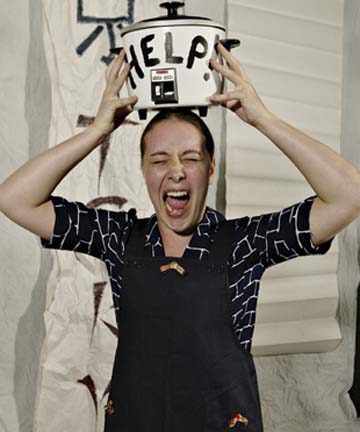
ANDREW SHIMABUKU PHOTOS
Malia Bowlby, left, and Brent Yoshikami find solace in their respective addictions in "Moral." Bowlby, also shown below, plays a mom under pressure in the drama, which opens tonight.
Tokyo in overdrive
A dark, complex Japanese
comedy comes to America
A rice cooker on the verge of exploding. A harried husband with a secret craving for inarizushi. Japanese words with several untranslatable meanings. Those are just a few things that make "Moral" a challenging experience at the University of Hawaii at Manoa Ernst Lab Theatre. Can Hawaii handle such enigmatic theater?
Colleen Lanki, director of the UH production, is cautiously optimistic. "It's pretty strange, and there's a lot going on, (but) I'm really curious and excited to see how people will respond to it," she said in explaining why she decided to bring this dark, complex comedy to America.
"Moral" is Japanese playwright Kisaragi Koharu's look at the social traumas that were a byproduct of Tokyo's baburu jidai ("Bubble Era") in the 1980s. It was a time when the Japanese economy soared and it seemed that the boom would continue forever. But many Japanese found the pressures of baburu jidai more than they could handle.
"The rice cooker is like the hearth of Japan ... and (this one) is almost exploding, and that's what I feel is happening to all of the people in the play," Lanki said. "They're being crushed by consumerism, the need to succeed, and tests and work and family (pressures) ... so much humanity was being lost. There was a drive to be an individual, but no methodology to be an individual.
"People were committing suicide because they couldn't afford (prestigious) things. It still happens, although things have changed, but those kind of pressures can still be seen in any society, particularly in an urban society."
Lanki describes "Moral" as an ensemble piece, but Malia Bowlby (Mother) and Brent Yoshikami (Father) are central figures. Mother copes by sneaking off to drink shochu (similar to vodka). Father craves inarizushi, a very simple food.
Lanki lived in Tokyo for 6 1/2 years in the late-'90s studying traditional Noh theater and kabuki dance while working as an actor/director/choreographer in the Kee Company, a bilingual theater group. Her experiences with the group helped prepare her for translating "Moral" into English.
"We were constantly negotiating language issues ... because the point was to try to make the shows that were accessible," she said.
The result was collage pieces "where not every one understood everything, but by the end of the show people got the (idea)," Lanki said.
Linguistic nuances extended to the group's name. It was pronounced "ki" (breath or inspiration in Japanese), and written as "key" (which unlocks objects in English) or written as "kee" in katakana, to separate it from martial arts ki.
Lanki said the UH production will mark the premiere of "Moral" outside Japan, and the first time it's staged by anyone outside the original company. It's also the first "Moral" performance in English, primarily in English, anyway. Lanki encountered several linguistic challenges when she and Tsuneda Keiko, an original cast member, began translating the script.
"Kisaragi wrote in a very expressionist crazy kind of way ... There's lots of movement and short scenes, things that are taking place inside a character's head. One minute they're in a department store doing crazy things, and the next minute the father is at home hearing voices in his head. It's very non-linear," Lanki said. "When I'm in Tokyo and over-tired that's exactly how my brain feels.
"This play is rife with interesting issues that I skirted around because of the rhythmic nature (of Kisaragi's writing). I've left some of it in Japanese with English superimposed on top of it. Hopefully the meaning or the feeling of it will come through," she said.
"In a lot of Japanese poetry there'll be a series of (characters) and you'll read it one way and it takes on one meaning, and if you start somewhere else it takes on a different meaning, and it's really full of double and triple meanings. (Kisaragi) did a lot of that, and also used a lot of rhythms so the number of syllables will match.
"I tried very hard when we were rewriting the script to capture some of that."
Lanki says she and Tsuneda would like to translate more of Kisaragi's plays. "Nobody outside Japan knows (Kisaragi's) work. I'm hoping this will get it out there."
"Moral"
Presented by the University of Hawaii at Manoa Department of Theatre and DanceWhere: Ernst Lab Theatre
When: 8 p.m. today through Saturday, and 2 p.m. Sunday
Tickets: $10 general; $8 for seniors, military, UH faculty and staff, and non-UH students; $3 for UH students with Fall 2003 I.D.
Call: 956-7655
Click for online
calendars and events.


